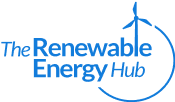During your journey of starting a website, you may run into references on blogs and forums about something called Domain Authority. If you are unsure about what it is or why it’s important, you aren’t alone. In fact, even people who have started multiple websites fail to understand its importance in the world of SEO and search engine rankings.
The truth is that domain authority is one of the most crucial aspects of your website and securing its success. It’s an important indicator of your website’s authority and contributes a huge portion to how you rank.
Even if your SEO scores are high and the quality of your content is on point, low domain authority can often cause your site to rank below a competitor’s site that has a higher domain authority score. If you’ve tried everything and still gotten poor results, the issue might lie with your domain authority.
The amount of information on how to boost your domain authority can be overwhelming and often conflicting. To help you wade through all the misinformation and provide actionable information, I’ve done the heavy lifting for you by compiling a list of the 9 best tactics to increase your domain authority in 2022 and moving into 2023.
With these nine tactics in your arsenal and implementing them consistently, you’ll be able to boost your domain authority and see your rankings reach new heights.
What is Domain Authority?
Domain Authority (DA) is a search engine ranking score formulated by Moz, one of the most respected SEO communities in existence. Ranging from scores of 1(not likely) to 100 (very likely), domain authority predicts the odds a website has to rank in search engine result pages (SERPs). The higher your domain authority score, the greater your chances are at ranking. This is a big deal especially if you intend to go head to head over competitive keywords and subject matter.
Domain Authority is based on data from Moz’s Link Explorer web index and incorporates a huge number of factors into its calculations. Keep in mind that according to Google, Moz’s domain authority score does not have a direct impact on your actual Google rankings. While that may be true, DA scores are determined using many of the same criteria that Google uses to rank their results.
How Does Domain Authority Help Me?
Although you may already have an idea about how domain authority can help, let’s spell it out and present a few examples. First, think about the top five friends currently in your life. Now, rank them according to which one you trust the most. If you look at your most trusted friend, you’ll likely be able to point to several factors that contribute to your decision to give them the top spot. Things like how long you’ve known each other, shared interests, mutual friends and a track record of on-point restaurant recommendations all came together to rank them higher than the rest.
Chances are that the friend you placed on the bottom of your list has fewer of these connection points than the person at the top. It’s the same principle with domain authority. Boosting your domain authority puts you in that most trusted position with search engines and online visitors.
Second, a high domain authority provides you with a distinct competitive advantage over other people in the same space as you. As I mentioned previously, many people including professionals don’t have any idea how to leverage domain authority.
Think of domain authority being that x-factor that helps to tip the search engine rankings in your favor. With all other factors (on-page SEO, quality content) being equal, the person with the higher DA will win out.
How Can I Check My Domain Authority?
1. Ahrefs
Ahrefs is a great tool for checking your domain authority although they refer to it as a domain rating. The free version of their Backlink Checker lets you check your score and see how it stacks up against your competitors. Remember, the higher the score the better.
You’ve got some spare cash or want to make an investment, the premium version of Ahrefs allows you to check more detailed statistics and get into things on a more granular level. It helps you understand the “why” behind the “what”. Knowing the little details is going to be helpful if you’re serious about boosting your domain authority.

Keep in mind that Ahrefs uses its own algorithm to determine its score. While it will be close, it may not be exactly the same as your Moz domain authority score. With that said, it will get you extremely close.
2. Moz Link Explorer
The Moz Link Explorer enables you to check any website's domain authority including your own. Since they are the group that developed the domain authority score in the first place, it is going to be the most accurate score you can get for this particular metric.
Once you know your Moz domain authority, you can take steps to improve it based on the additional info Moz gives you, which includes: linking domains, inbound links, ranking keywords, recent linking changes, and more. After looking at your own score, it’s a good idea to do some research into your main competitors and see how they stack up. You’ll likely see that the ones that repeatedly beat you out have a higher domain authority than you. Pay attention to the deep analytics too. It will give you a decent idea of what needs to be done in order to surpass them.
The reason other options are included in this section besides Moz is because signing up for their tools can be incredibly expensive especially if you are just starting out or don’t run an SEO agency of your own where it would be worth the investment.
With that said, they often offer free or $1 trial offers that can let you access most of their tools for a short period of time. It’s usually all you need to get your score and a good idea of how to move forward. But if you have the cash laying around, their tools are powerful and worth the money especially if you are trying to optimize more than one or two websites.
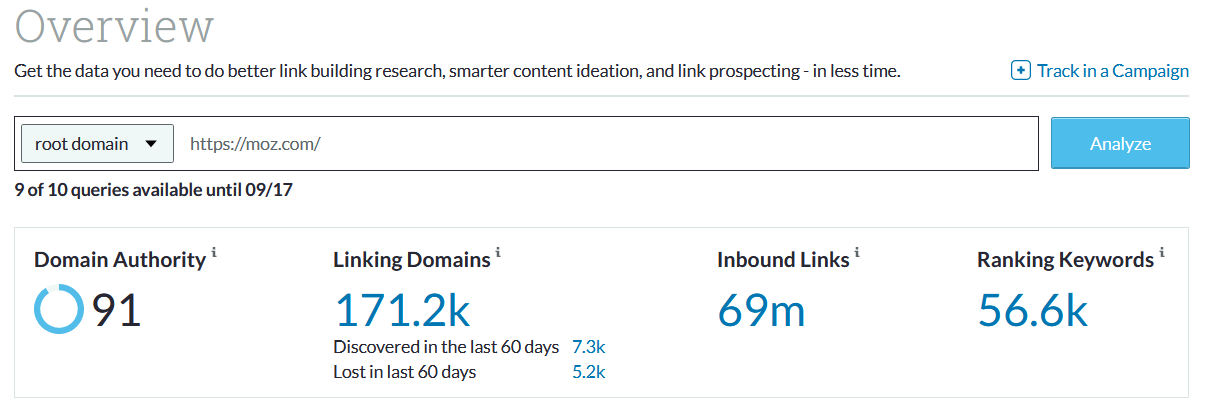
Moz requires you to make a free account to use their Link Explorer, but it's worth it as you get several additional statistics to improve your website and authority.
3. SEMrush
This company has built a cult-like following because of the effectiveness of its tools and deep analytics. Finding your domain authority and page authority is easy with SEMrush and their suite of intuitive tools.
You can use SEMrush to see the specific authority for a domain or a specific page and the factors that are contributing to them. SEO professionals swear by SEMrush and for good reason. Its host of tools can provide that slight edge to get over on competitors. They offer a free trial that unlocks nearly all the tools you’ll need.
SEMrush makes it very easy to see organic search traffic, paid search traffic, and backlinks, as shown below.

What is a Good Domain Authority Score?
As we mentioned earlier, domain authority scores rank from 1, representing lowest authority all the way 100, meaning highest authority. In a vacuum, it’s best to get as close to that 100 score as possible. However, keep in mind that some websites even with years of SEO best practices may not even crack an 80 or 85 score. Those that do are extremely valuable because they occupy rarified air.
For reference, the worldwide average domain authority score ranges between 50 and 55 with millions of domains far below a score of 10. A better way to define what a good domain authority is, is through the lens of your competition and industry. A good domain authority score is anything higher than your fiercest competition’s score.
As long as you can maintain that domain authority edge, you will win the SEO “jump-ball” every time in situations where everything else is equal between your page and your competitors’.
How is Domain Authority Calculated?
Domain authority isn’t something you’ll be able to calculate on your own since it has to factor close to a hundred different data points that you may not have access to. You will need to use some sort of online service or tool to calculate it for you.
Different websites calculate domain authority differently however most of them will be within the same ballpark. You may calculate your domain authority using a DA checker like the Ahrefs backlink checker. They have been in the game since 2010 and have a rock solid reputation to back up their tabulation.
You can also go straight to the source of domain authority and use Moz’s tools to calculate your score. The architect of Domain Authority, Moz, uses over forty factors for determining your DA.
Domain authority calculated using Moz is always going to be your best option. However, Ahrefs is a great option since their tool doesn't require creating an account or getting onto a trial.
How to Increase My Domain Authority?
To increase domain authority, it's crucial to implement strategies that boost the credibility of your website. Resist the urge to hop online and just try a lot of random things. A frazzled, shotgun approach will not yield meaningful improvements to your domain authority.
In order to grow your DA, you need to consistently follow a strategic plan that helps you build a framework that will supercharge your authority building efforts instead of diminish them. Let’s look at some specific strategies that will have a massive impact on your domain authority.
1. Work on Your Off-Page SEO
Improving your off-page SEO refers to the process of maximizing the quality and quantity of inbound links and other connections with outside domains. Remember the example we used earlier about the friends that you trust? Look at off-page SEO as the process of building your network of mutual friends that both you and search engines trust and respect.
Improving this component is not easy work. You have to be intentional and make sure that the quality of your inbound links come from reputable sources, ideally with a higher domain authority than you. This process is also referred to as a strong link profile.
What Is a Strong Link Profile?
See a link profile as a giant picture of a family tree but for your website. A link profile includes incoming backlinks from other websites, internal links, and external links. A website with a strong link profile will have:
- A large number of links from unique root domains with high quality links.
- Avoids low quality links (No Spam Backlinks)
- Incoming and outbound links are to relevant websites.
Google is always going to favor websites with a strong link profile. The techniques below will assist you in building a profile of links worthy of a higher DA score and better Google rankings.
How do I Improve My Link Profile?
Focus on acquiring links from high domain authority websites that are relevant to the content of the page you are linking. Do not link your page about lawn equipment to a cooking blog. This is a surefire way to get on Google’s bad side.
By focusing on relevant, high-quality links, you will build a better collection of links for yourself that will translate to a higher domain authority.
Use one of the key link-building strategies below to grow your profile of links.
Remove Bad Links From Your Profile
Be ruthless in getting rid of bad, low relevance backlinks from your profile. Leaving bad backlinks will harm your domain authority score.
Removing bad links can be hard especially if you have hundreds and even thousands to sift through. You may not even know how to tell if a link is bad or not. The good news is that there are online tools you can use to help. You can find bad links using an SEO tool such as Moz.
This process can be time consuming but I promise it’s worth it. Removing these bad links from our link profile will multiply the positive effects of adding more high domain authority links in.
Remove Links from Spam Sites
Spam sites can kill your domain authority. Just like how people view you differently if you spend a lot of time around a large group of spammy friends, the same is true about your website. Search engines view your links as a reflection of who your website is. If your site is filled with spam links, it’s going to diminish you in their eyes.
Doing this process has become a lot easier since Moz has a spam score checker, which helps you easily identify spammy links so you can start getting them off your link profile. The way this tool works is that it produces a spam score for each of your links based on how many times they have been dinged by search engines as spam. With these numbers, you can make an educated decision on which links to keep and what ones to cut loose.
Moz recommends investigating further before taking action on removing a link to a site with a high spam score or requesting they stop linking to you. It’s better to double check than to have the regret of needlessly cutting off a good link.
Strengthen Your Link Profile
Now that you’ve done the hard work of cutting toxic links out of your life, it’s time to fill the gap with high quality, high domain authority links. This is where you are going to see the fruit of your labor from the previous process pay dividends.
Besides improving your scores, high quality links from legitimate sources will also improve your organic traffic flow which further increases your standing in the eyes of search engines.
Focus on finding authoritative referring domains that are relevant to your web page. Links are a decisive ranking factor in the Google algorithm and the more you can produce that are relevant to your niche, the faster you will improve. In the following parts of this guide, you will find useful link-building strategies to increase website domain authority.
#1 Natural Link Building
Natural link building is when you build high-quality content in a blog post or a page, and another website links to it.
Bloggers and websites may link to a page for a variety of reasons.
- The page explains a topic mentioned in the article in further detail.
- The page is useful for its readers (such as a guide)
- Linking to the webpage makes the content more reputable, such as linking to a study.
The best way to go with natural link building is to be natural! Start looking at content that is gaining traction in your niche and create valuable content with your unique spin on it. There is no shortcut to this. Whether you do it yourself or hire someone else to do it, quality content is essential to the natural link-building process.
Usually, the more in-depth content is the best way to go for natural link building, as someone trying to learn about a topic for the first time will find it helpful, such as with this guide.
#2 Blogger Outreach
Reaching out to other bloggers is a great way to increase your linking root domains. Remember, your goal is to increase domain authority, so only contact bloggers with high-quality websites that are relevant to your website.
Bloggers often publish content on their websites that need quality references. As a result, they have lots of chances to give links to relevant websites. In blogger outreach, your goal is to find a way to join your interests with theirs. Figure out a deal in which you can both benefit.
Some common blogger outreach tactics include
- Writing a guest post in exchange for a backlink from their website.
- Putting a link on your website if they put a link on their website (link for link.)
When writing guest posts, it's important to focus on creating high-quality content for blogs, as Google has started penalizing low-quality guest posts. Really put some effort into your content. Your host blogger will appreciate it too. Guest posting is a great way to get valuable links from sites with a much higher domain authority than your website (but it's only effective when you follow best practices).
#3 Broken Link Building
With this strategy you can leverage another website's broken link and convert it into your backlink. A broken link is a link that no longer works for one reason or another. Broken links are often entirely broken in that they link to pages that no longer exist. Other links may be outdated or lacking in quality.
Getting backlinks from fixing broken links will help you get a higher DA. Here's how you do it:
- Use a tool that allows you to check for broken links, such as Dead Link Checker.
- Create content that may replace the dead link content or find pre-existing content on your site that may replace the dead link.
- Reach out to the website and offer for them to use your relevant content instead of the broken link.
Broken link building is a great way to help other websites fix bad links while getting your website closer to being that upper-authority domain. This strategy is often overlooked because it does require being extremely proactive both in finding the broken link but then to create and deliver it as well.
#4 Reclaim Lost Links
You can reclaim lost internal links and external links to improve the authority of a website. One of your own links may break, and it's crucial not to let these guys fall to the wayside underutilized.
Google doesn't like seeing broken links on a website and will penalize you for it if it sticks around for too long. When a user clicks a link and doesn't get to go where they want to, it ruins the user experience and sends negative signals to Google.
Using a tool like Screaming Frog, you can check your website's internal links and see if there are any broken internal links. Once you’ve found them, you need to get them repaired immediately. Depending on how many you end up fixing, this can result in a pretty significant increase in your domain authority score.
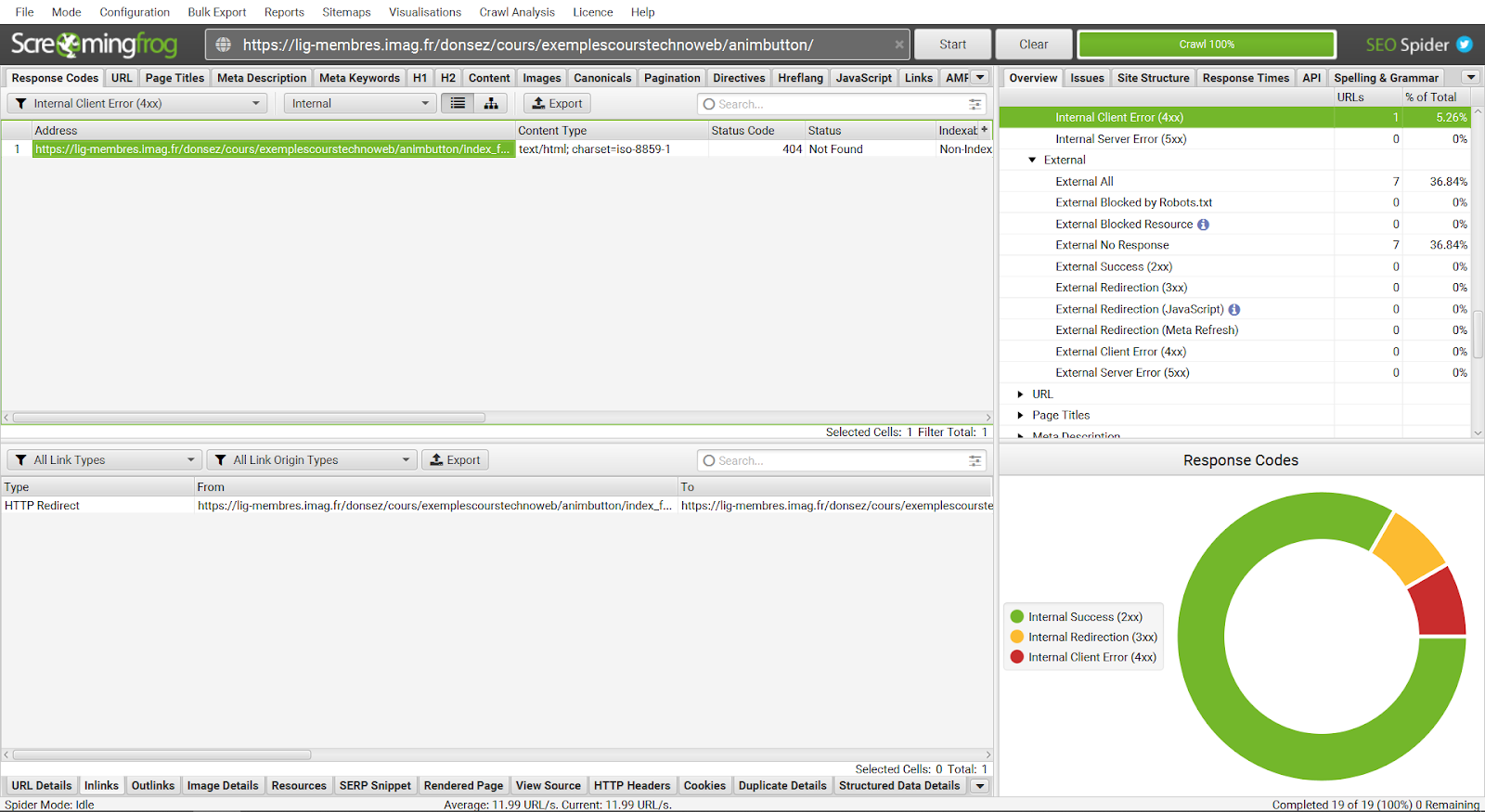
Here’s some guidance on how to use Screaming Frong to uncover your lost links:
- Initiate a crawl for your website and let it finish.
- Once your crawl is complete, select "Internal Client Error (4xx)" on the right sidebar.
- Click on one of the 404 pages on the list.
- Click the "In links" in the bottom left.
- You will now be shown pages linking to your 404 pages.
When you find a broken internal link, you can either update, replace or remove the link. If at all possible, always look to either update or replace the link. Remove it only if it cannot be salvaged.
2. On-Page SEO Optimization
Think of your web page as a grocery store for a moment. In order to get customers to spend all their money on your items, it helps to create a positive and intuitive environment that is relevant to what they need and also easily connects them with the specific things they desire.
In a grocery store, big signs above the aisles and various departments help shoppers know how to navigate to what they want without frustration. The same is true for your website. It’s important that your on-page SEO is rock solid so that search engines feel comfortable recommending you to visitors.
The most important on-page SEO factors are:
- Your page's meta description and title.
- The page's permalink and URL structure.
- Headings and words mesh together nicely.
- Images, videos, and other elements such as widgets are being optimized for SEO.
- Having the right combination of keywords and tools like Surfer SEO can help with this.
- Internal linking between your website's pages.
There are many on-page optimization strategies however the most important thing is to remember the fundamentals and create high-quality content that search engines will love. From that foundation, it will be easy to implement good on-page SEO.
3. Improve Your Technical SEO
Technical SEO refers to website and server optimizations that aid search engine spiders in crawling and indexing your site more effectively. This results in higher organic search rankings.
Website owners are often intimidated by the prospect of technical SEO. In reality, technical SEO is a simple thing that only needs to be done once as long as you do it right. There are many online guides on how to properly implement technical SEO.
Sadly, a major cause of low DA scores is because this aspect was not addressed. For help, you can check out this definitive technical SEO guide by Backlinko. By improving your technical SEO, Google's search engine will be more likely to show your website higher in search results.
4. Make Sure Your Website is Mobile Friendly
With over 50 percent of online searches being on mobile, making sure that your website is mobile-friendly is more vital than ever. Optimizing your website for mobile will improve ease-of-use for your visitors and encourage them to stay on the website for longer. Additionally, if Google sees you are optimized for mobile, it will weigh more in your favor than another website that isn’t.
Remember, Google wants to provide the best experience possible for its user. That means if the user is on a mobile device, Google knows that it’s best chance at delivering what the user needs will be on a mobile optimized website.
You may improve your site's mobile friendliness by:
- Viewing the site on your phone; should be easy for a first-time user to navigate.
- Designing pages so buttons, text, and the size of other elements are a good size for mobile.
- Avoiding placing pop-ups and ads on your site.
- Having a simple site design.
- Having fast mobile site speed.
While you can keep them on the desktop version it’s best to keep pop-ups off of your mobile site.
Don't Create a Separate Mobile Site
Some people create a mobile site and redirect users from there to the mobile versions of the pages. The issue with this approach is that you are sending them to another site, which isn't great for SEO.
So if you create a separate mobile site, Google will view your website as two separate sites. In this scenario, you would be cutting your SEO effectiveness in half.
Creating a separate mobile site is unlikely to be the right choice for your site. If you did choose to make a separate site for mobile, you would be sacrificing SEO and DA significantly not to mention it would be a lot of work.
Dynamic Serving
Level up your website with dynamic serving. Dynamic serving dynamically optimizes a webpage for any device it lands on.
Make sure the tool or provider you select for dynamic serving is accurate so that it provides an optimal viewing experience no matter what device it is being viewed on.
Responsive Web Design
Responsive web design adjusts the content based on the screen size it is being viewed on. The good thing is that a lot of website builders like Squarespace already include this into their building framework allowing you to easily take advantage of the SEO benefits it can yield.
It’s not an exact science so it’s always good to review your website regularly on different devices to make sure that everything is rendering out correctly.
5. Improve Your Page Speed
High page speed is important because people hate to wait around. In fact, if your page takes more than a few seconds to load, most people will not stick around. This presents a great opportunity for people that are willing to optimize their website for speed. Lots of website owners don’t know what steps to take to speed up their pages so they just simply let them lag. It’s an advantage waiting to be leveraged.
Improving your page speed could mean using lower file size photos, better hosting servers, and less time draining content on the webpage.
Check your page speed and get specific suggestions for improving page speed using Page Speed Insights. You get a performance score showing key performance metrics for web page speed along with a list of suggestions on how to improve it even more.
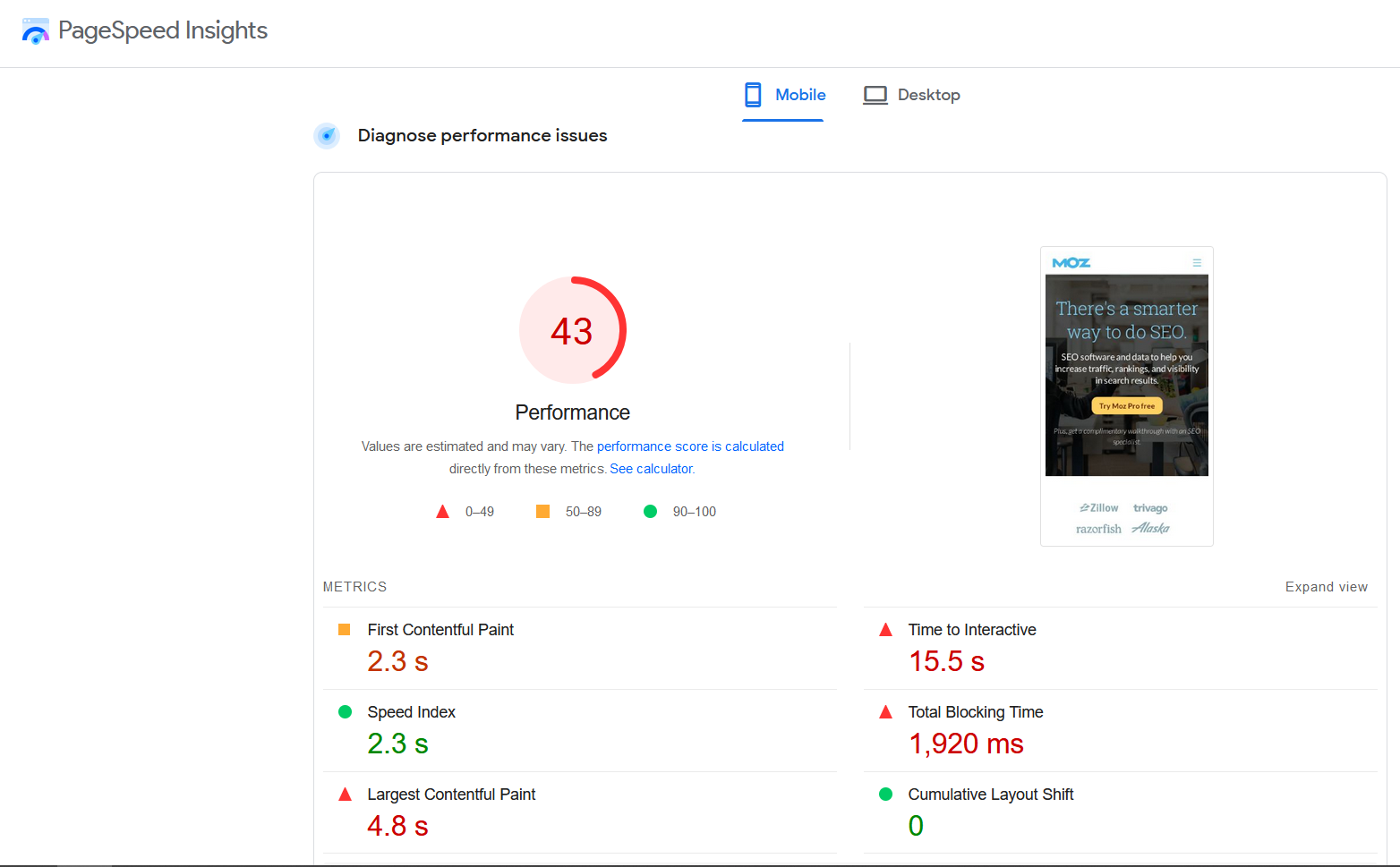

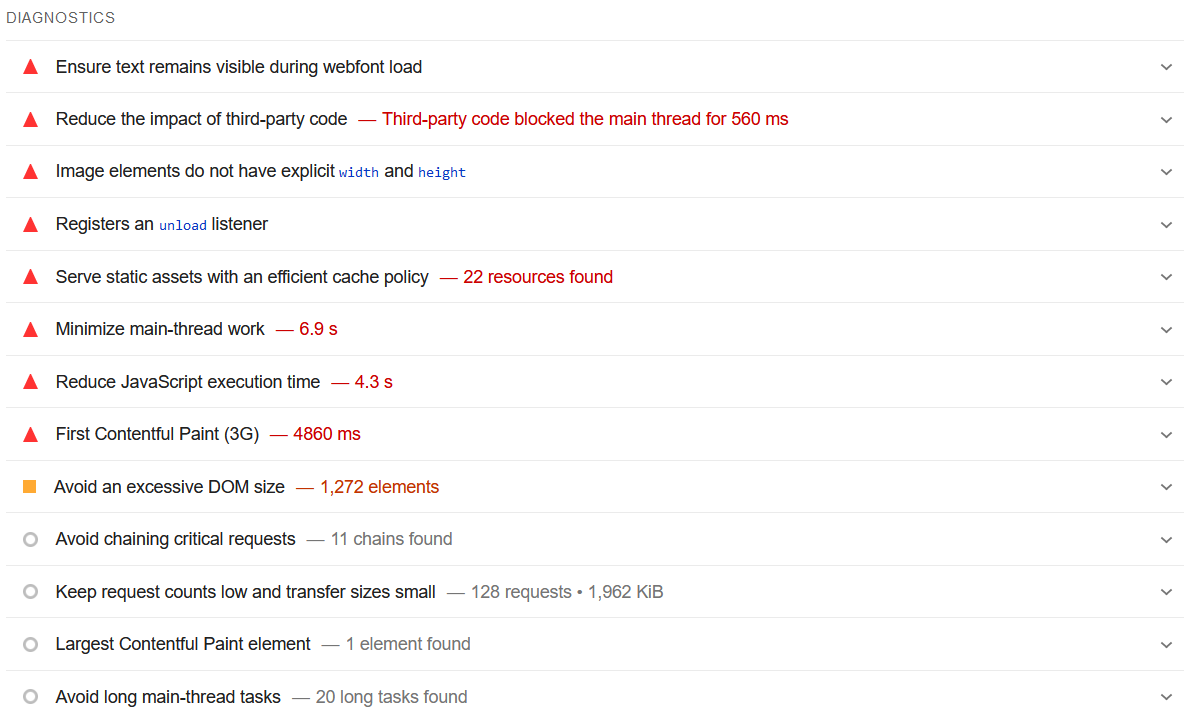
To save some on time, Experte has a handy tool that bulk checks the speed of your entire site.
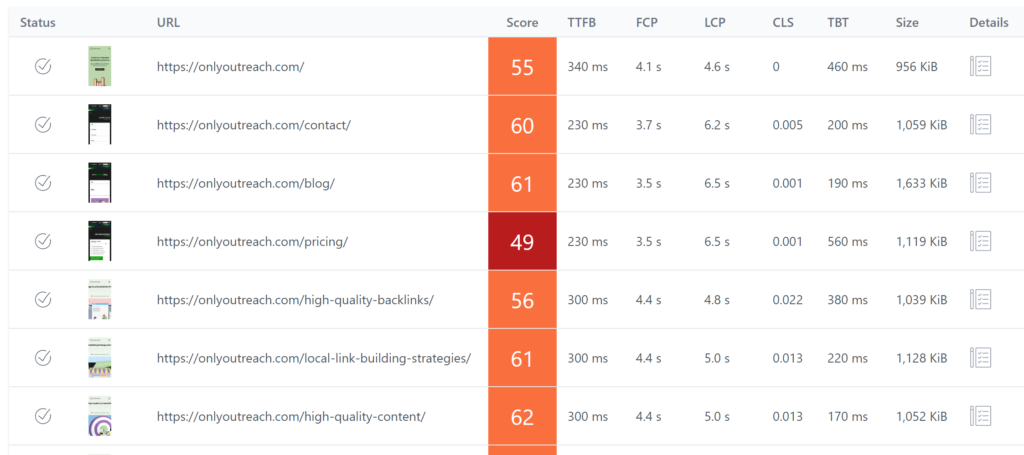
A faster speed for your site will improve your Google rankings which can help you attract more links and thus gain domain authority.
6. Focus on Social Signals
High ranking pages have tight social platform connections. Increase your domain authority by leveraging the power of social signals. There’s a broader conversation happening on social media that your website can be a part of as long as you know how.
Social signals not only boost your domain authority but can also increase the organic traffic coming to your page.
Boosting your social signals can be as easy as encouraging users to share content from your site to social media. Be active on social channels and get as many likes, comments and retweets pointed towards your site as possible.
The most effective way to do this is to start engaging with the community that would find your content worthwhile and offering value wherever you can. Don’t be spammy, come from a genuine place and people on social media will reward you in the long run.
Here are some useful social media choices you may sign up for to increase domain authority:
- Facebook.
- Twitter.
- YouTube.
- LinkedIn.
- Instagram.
- Pinterest.

Having profiles on all these high authority social domains will do wonders for your domain authority if you do it right.
7. Rank for More Keywords
Lots of people try to mystify the process of ranking for keywords. In reality, it’s a simple process that simply requires you to produce content in which the keywords you want to rank for would be the most relevant.
Try to avoid keyword stuffing where you overload your page with the same keyword plastered dozens of times. Google is smarter than that and can pick up what’s going on. Focus on putting your keywords where appropriate a maximum of six times per page.
Your best bet for ranking for more keywords is:
- Publishing high-quality content.
- Getting backlinks for high-quality content.
- Following good SEO practices for your site and pages.
- Aim for the keywords you can rank for.
Sites with lower domain authority may want to aim for keywords that have less competition. Ranking for low competition keywords with high search volume is the ideal balance for leveling up your DA.
8. Keep Your Site Fresh
Google wants its results to be filled with continually updated, high-quality sites. If you let your website sit without any action for even a few weeks, it could affect your overall domain authority score.
Remember, you need to give Google a reason to keep crawling your site. Keep working to rank for more keywords. A proactive keyword ranking strategy will help show Google you’re keeping it fresh.
To maintain your position in the Google SERPs, it is necessary to update the content driving traffic, build new content and keep your site on the cutting edge. In other words, feed the golden goose.
9. Pay Close Attention to Your Domain Authority
It’s important to keep tabs on how your domain authority develops as you continue to implement these strategies. The reason is because you need to know what is working and do more of it. On the flip side, if you are doing something that is hurting your domain authority, you need to know right away so you can reverse course.
Traffic and rankings will go up slowly as long as you pay close attention to them and make adjustments. The Moz Link Explorer is fantastic for getting a long-term trajectory of your domain authority.
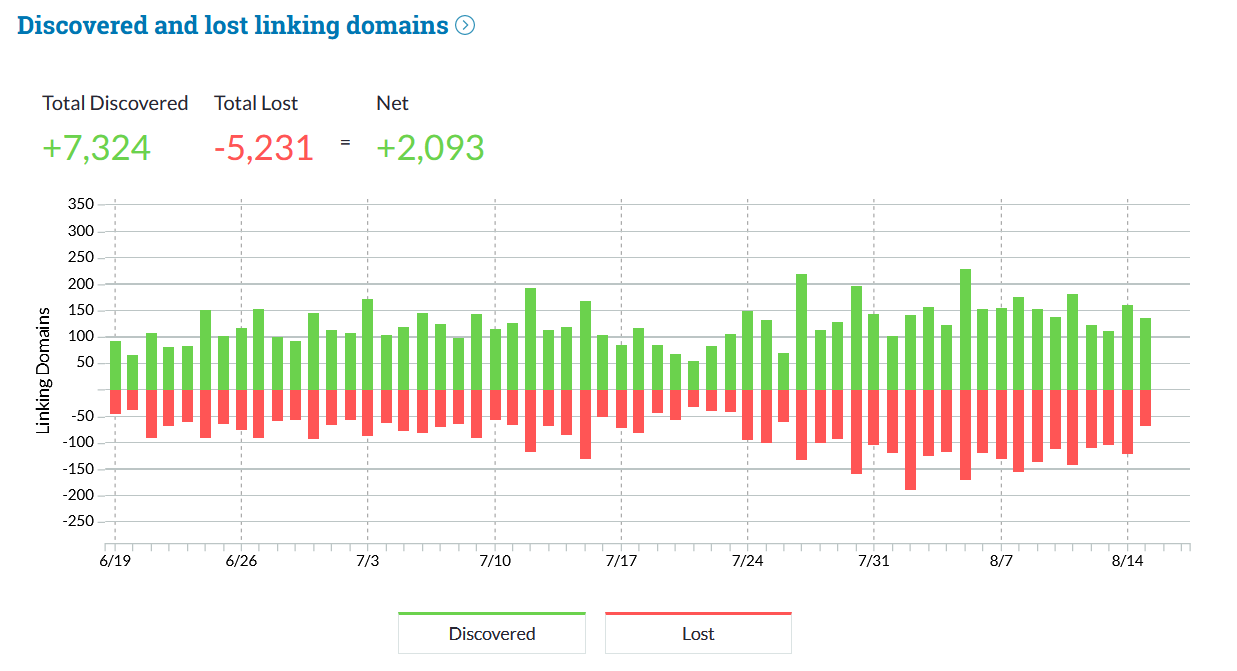
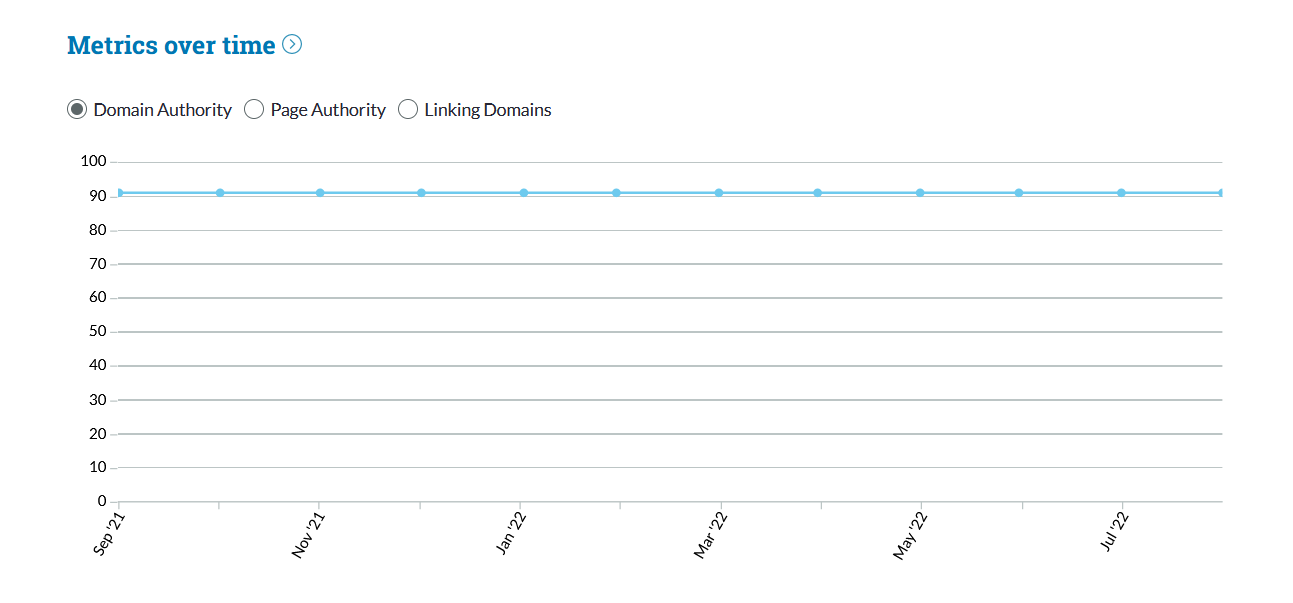
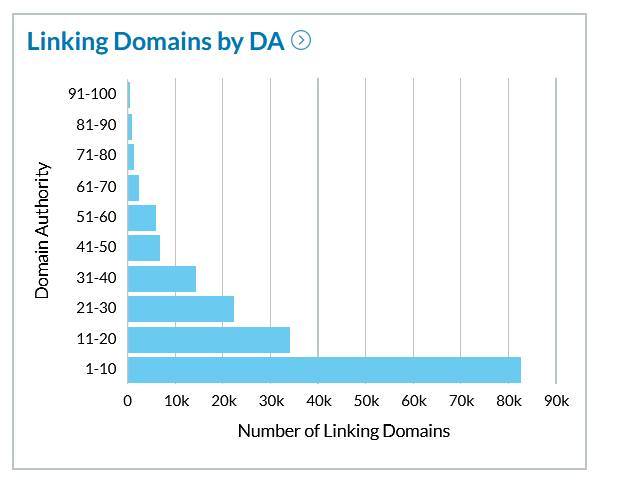
Tracking your domain authority and progress with Moz will help encourage you to keep growing your authority as you can see the results and where you started.
Ways to Use Domain Authority in Your SEO Strategy
Your SEO strategy should be built to raise domain authority carefully, and DA should be a key focus in your SEO strategy. High quality content and increasing traffic are the keys to success.
Choose Keywords According to Domain Authority
Certain keywords may be out of reach due to your current domain authority. There's still a chance you could rank for these keywords, but it would not be easy against websites with higher DA.
What's most effective is to write content with keywords that your current DA can compete for; that way, you can start getting people to see your site and build a following. You can go for more competitive keywords as your domain authority increases.
Scale up Link Building
It's crucial to scale up link building to improve a site's authority.
An important aspect of link building is doing it at scale. Doing it at scale means getting more links, and you may get more links to your site by enlisting additional helpers for link building and improving your techniques.
For your site, it may mean additional guest posting so that you can get more backlinks. For another website, it may mean leveraging fixing broken links on a bigger scale. Many websites have found success implementing multiple strategies.Have a clear plan for how you will scale link building and execute it.
Establish SEO Goals
Having SEO goals will help you get closer to getting that high DA you crave because it will help you more clearly define your strategy moving forward. Keep in mind that SEO and domain authority feed into one another.
Building up your domain authority takes time; it's often the beginning that is the hardest, then it gradually gets easier as you become more popular and reputable. To help with this process, focusing on short term SEO tasks and celebrating those wins will help you get through.
The start of the path to increasing domain authority is the hardest part; from there, it only gets easier. Be easy on yourself starting and give yourself the room to take some time to reach a better domain rating.
Frequently Asked Questions
How Many Links to Increase Domain Authority?
It’s less about how many links and more about the quality of the links you are using. The more high quality, relevant links you can add the better your chances of increasing your domain authority.
It will take multiple links from relevant and authoritative websites to increase domain authority. A link building plan for getting a higher number of links from high authority domains will be found above in this guide.
How Fast Can You Increase Domain Authority?
This is different for each website and is dependent on a variety of factors. The most important factor is in your ability to execute effective strategies that lend itself to growth. Do your best to implement the strategies in this guide and find ways to scale up your link building over time.
The speed at which you increase your website's domain authority relies entirely upon your own efforts. There is no one stopping you from getting high domain authority. You have full control over how successful your website is.
Is 40 Domain Authority Good?
40 domain authority is much higher than 0, but it depends on who you want to outrank. If all your competitors have 80 domain authority and you have a 40, you’re going to have a rough go of it.
A better approach is to research the DA of your competitors and define a good domain authority as one that is higher than theirs.
Is a Low Domain Authority Score Bad?
A low domain authority that is lower than your competitors is a bad thing.
A low domain authority score in competitive niches makes it challenging to rank on Google search. A high domain authority website will have an easier time ranking on Google than lower DA sites.
What is bad and good for your specific website depends on who you want to outrank.
What Are Good Domain Authority Scores?
As close to 100 is the simple answer. If your website has a perfect score, there is very little that your competitors can do to unseat you. However getting a score as high as that is extremely rare and is often reserved for websites like Facebook and Twitter.
A better metric of what a good score for your website is to see the domain authority scores of your competitors and use them as a frame of reference. Once you’ve got those scores, shoot for a score at least five to ten points higher than theirs.
What's the difference between Domain Authority and Page Authority?
Page authority and domain authority are different.
Page authority refers to the credibility and relevance of a particular page on your website. This can be affected by on-page SEO, meta descriptions, keywords and backlinks that are present.
By contrast, domain authority refers to the standing of your website as a whole in the eyes of search engines like Google. Domain authority is a way of measuring how likely search engines will favor you based on the entirety of your SEO efforts and content.
Conclusion
Domain authority is a crucial indirect ranking factor that you should pay close attention to. It’s also a component that many people aren’t aware and thus can present a great growth opportunity for you.
Start with the strategies outlined in this guide and keep tabs on how your domain authority score develops. Don’t be discouraged if you don’t see improvement right away. If you stay the course, the breakthrough will happen eventually.
Remember, the best domain authority score for your website is the score that’s higher than your competitors. As things online become more competitive, you’ll be glad you took the time to invest in improving this facet of your domain.

















